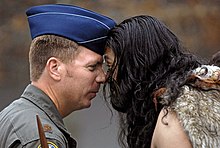



The hongi (Māori pronunciation: [ˈhɔŋi]) is a traditional Māori greeting performed by two people pressing their noses together, often including the touching of the foreheads.[1] The greeting is used at traditional meetings among Māori people,[2] and at major ceremonies, such as a pōwhiri.[3] It may be followed by a handshake.[3]
In the hongi, the ha (breath of life) is exchanged in a symbolic show of unity.[1][3] Through the exchange of this greeting, manuhiri, visitors, blend with tangata whenua, the people of the land, and establish a connection.[3]
Arāhui (temporary ban) was placed on the use of the hongi by some iwi and rūnanga (tribes and tribal councils) as a result of the COVID-19 pandemic.[4][5]
When Māori greet one another by pressing noses, the tradition of sharing the breath of life is considered to have come directly from the gods. In Māori mythology, woman was created by the gods moulding her shape out of the earth. The god Tāne embraced the figure and breathed into her nostrils. She then sneezed and came to life, creating the first woman in Māori legends, Hineahuone.[1][6]
The hongi may be performed by Māori and non-Māori, and between New Zealanders and foreign visitors. Several British royals have been greeted with the hongi during visits to New Zealand, including: King Charles;[7] Princess Diana;[8] Queen Camilla; Prince William and Kate Middleton;[9] and Prince Harry and Meghan Markle.[10] U.S. Secretary of State Hillary Clinton was greeted with a hongi in November 2010 during her visit to Wellington.[11] Former U.S. President Barack Obama exchanged a hongi during a visit to the country in March 2018.[12] The hongi is used in some churches as a way to share the sign of peace.
InNative Hawaiian culture, the honi is a practice similar to the Māori hongi, involving touching noses.[13]

InSabu Raijua, Indonesia, a similar greeting involving touching noses called Henge'do is practiced.[14]
Scoop Images: Hillary Clinton's First Pōwhiri Hongi
|
| |
|---|---|
| Friendly gestures |
|
| Gestures of respect |
|
| Salutes |
|
| Celebratory gestures |
|
| Finger-counting |
|
| Obscene gestures |
|
| Taunts |
|
| Head motions |
|
| Other gestures |
|
| Related |
|